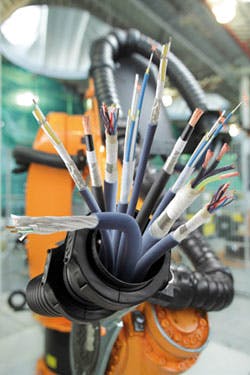New Twistable Robot Cables
New twistable hybrid, bus, motor and fiber-optic cable options are available in the IGUS INC. Chainflex series of torsion-resistant robot cables. Five of these are offered with a PUR outer jacket.
CF-Robot 9 is a hybrid control cable that is available shielded or unshielded. CF-Robot 8 is a shielded bus cable, while CF-Robot 4 is a shielded position-feedback cable. CF-Robot 6 and CF-Robot 7 are servo-motor cables that are available shielded or unshielded. Each of these models is oil-resistant and flame-retardant.
CF-Robot 5 is a fiber-optic cable with a TPE outer jacket. It is oil- and UV-resistant and flexible at low temperatures, with a minimum bend radius of 12.5 times its diameter. CF-ROBOT is the original single core, shielded cable of the range, which is PVC-free and oil- and UV-resistant.
Standard Chainflex continuous-flex cables for cable carriers are designed for linear applications and have been tested over millions of cycles in the igus test laboratories. However, state-of-the-art automation involves increasingly complex movements, for example torsional motion on a robot. Whether a cable can cope with torsional demands depends very much on the application and type of installation.
According to igus Inc., the torsion-resistant requirement for cables in cable carriers is not new, but has seldom been defined. For this reason, it’s difficult to evaluate a statement such as, "This cable is torsion-resistant up to ±180°."
To satisfy this requirement, igus Inc. developed a torsion test bench on which its robot cable types are repeatedly twisted. The degree of torsion can be freely chosen and can vary for each test specimen. The test standard is ±180°. After a prescribed number of cycles or a negative electrical or mechanical test result, the respective test specimen is taken apart, and the type and position of any damage can be determined exactly.
CF-Robot is suitable for multi-axis cable carriers, such as igus’ Triflex® R cable carrier, which is designed to protect moving cables and hoses on six-axis robots. Triflex R is able to move through all axes and can twist up to 380 degrees per yard, enabling easy movement through complex configurations.
Visit www.igus.com
